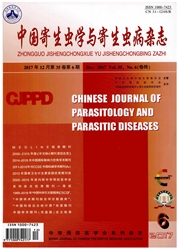

 中文摘要:
中文摘要:
巨噬细胞迁移抑制因子(MIF)是一种重要的促炎和免疫调节蛋白,作为天然免疫应答级联反应的上游因子,参与调节适应性免疫应答,负反馈调节糖皮质激素的抗炎功能,调节细胞增殖与分化、细胞凋亡和细胞周期,并参与调节多种寄生虫感染与免疫过程。疟原虫、硕大利什曼原虫、马来丝虫等多种寄生虫的MIF与哺乳动物的MIF为同系物,并参与调控虫体与宿主的相互作用,发挥新型的免疫逃避作用。因此,针对抗MIF的小分子抑制物和疫苗的研发为上述相关寄生虫病的预防和治疗提供了一条全新的途经。
 英文摘要:
英文摘要:
Macrophage migration inhibitory factor (MIF) is an important proinflammatory and immunoregulatory mediator, which locates at the apex of the cascade of innate immune response. It also plays an important role in regulat- ing adaptive immune responses and counter-regulating the immunosuppressive effect of glucocorticoid. MIF is actively involved in a series of cell processes such as cell proliferation and differentiation as well as cell apoptosis. MIF is reported to regulate the host immune response to parasitic infection. Interestingly, the ortholog of mammalian MIF was identified in multiple parasites such as Plasmodium spp., Leishmania major, Brugia malayi and so on, which is actively involved in the regulation of host-pathogen interaction and therefore provides a novel immune evasion mechanism. Therefore, development of small molecular inhibitors and vaccines against MIF will pave a new avenue for the prevention and treatment of related parasitic diseases.
 同期刊论文项目
同期刊论文项目
 同项目期刊论文
同项目期刊论文
 Evaluation of the protective efficacy of the gender-associated Schistosoma japonicum tyrosine kinase
Evaluation of the protective efficacy of the gender-associated Schistosoma japonicum tyrosine kinase IL-12 Enhances Protective Immunity with Recombinant Schistosoma japonicum hypoxanthine-guanine phosp
IL-12 Enhances Protective Immunity with Recombinant Schistosoma japonicum hypoxanthine-guanine phosp 期刊信息
期刊信息
